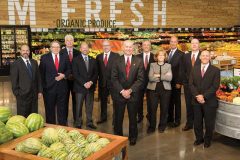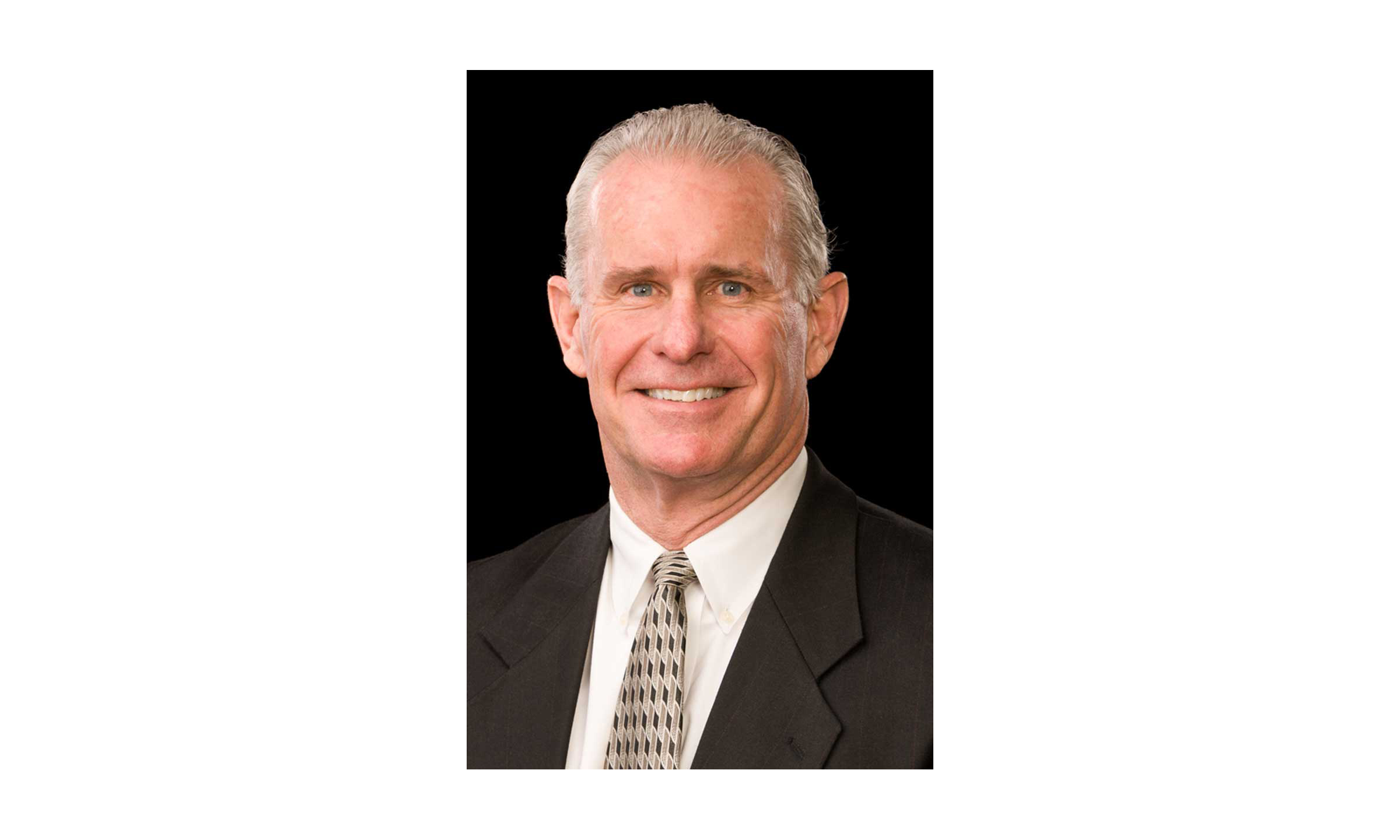Ray Sprinkle has been at the helm of URM Stores Inc. in Spokane, Washington, for four years now. During that time, the retailer-owned co-op has enjoyed some bright spots, like sales growth and a frozen and refrigerated warehouse expansion, while also weathering some storms, including a data breach.
The future looks to be mostly sunny, Sprinkle indicated in an interview with Ron Johnston, president of Shelby Publishing Co. and publisher of The Shelby Report, at the company’s offices in Spokane on Oct. 31. That’s thanks to a strong financial foundation and attention to keeping its retailers competitive.
Positively speaking
On the bright side, there is the opportunity to gain business from the June 2017 purchase of Unified Grocers by Supervalu, which impacted retailers in the Seattle, Washington, and Portland, Oregon, markets, in addition to California. (Grocers within a 400-mile radius of Spokane are the ones URM is most interested in serving, for logistics reasons, Sprinkle noted.)
The Supervalu/Unified deal, according to Sprinkle, “opens the door for us to be able to contact those former Unified members that want to continue to be a part of a co-op. We want to make sure they understand there are options out there. We believe we have a viable business model to entice them.”
One enticement is a tax strategy that enhanced the rebates back out to the membership in 2017.
“We were able to put more money back into the membership that made a number of sacrifices early on to be able to allow this company to be successful,” he said.
For URM’s fiscal year that ended July 29, 2017, member-owner distributions were 36 percent higher than the prior year.
Another huge positive is the fact that URM is debt free.
“We do not need the retained earnings that we’ve had to have in the past to service debt, so now we’re able to funnel those monies back to the membership and reward them for many years of supporting URM,” he says. “And URM needs to continue to support them and their growth to be able to be successful.”
Keeping it fresh
URM has been careful over the last few years to make sure it had the fresh product needed by its members and customers, as frozen and refrigerated are its fastest-growing categories.
Even before Sprinkle took the helm, a produce facility—Peirone Produce—was completed in an off-site location to better serve retailers, and two years ago, URM expanded its refrigerated and frozen capacity by more than 75,000 s.f., increasing its capacity in these areas by 49 percent.
“We make sure that we have the space needed to support our retailers,” he says.
Tracking with demographic changes, URM implemented a full-line Hispanic cross-dock program this past year as well as a specialty/natural/organic cross-dock program “so we can continue to meet the needs and offer the variety that’s necessary to keep our members competitive.”
In the Hispanic-targeted stores—many of them in the crop-yielding regions in the southern part of Washington—“you have to have the right product mix at the right price. Otherwise, you’re not going to be successful.”
Sprinkle said URM has had to “rely on some outside experts to help us make sure that we can partner with a cross-dock vendor that gets us that item mix that’s necessary at a competitive price.”
Taking care of technology
To improve its overall business, the company is in the process of gathering bids for a new computer operating system to replace the one it has had for nearly two decades.
“Within the next 12 to 14 months we’ll be completing that, so that we’ll have an operating platform that will keep us current for many years to come,” Sprinkle said.
Technology actually has been a top-of-mind subject for the company for the last few years. Six months into Sprinkle’s tenure as president and CEO, “we were breached and hacked. So the first two years, that’s basically all I dealt with—the ramifications of being hacked. It did affect about 40 percent of our customer base, but since then we have stepped up our IT game.”
He says some people think URM has gone too far in its efforts, “but I don’t think we can go far enough to protect ourselves and our member-owners. Technology security will always, because of what we’ve gone through, be a very sensitive subject, so we need to continue to think about how we remain secure. The hackers out there get much more sophisticated every day, so we need to stay on top of it. There is no end to that journey. It has to be ongoing. So we are concerned about that.”
Hiring the right people is one of the keys to keeping data safe, he added.
“We can have all the controls in place, but the weakest link is personnel. Therefore, we have to be very cautious about hiring, and the amount of training and the dedication to security has to be there. We cannot afford to have a second breach.”
He said that caution extends to helping member-owners keep their data safe as well.

Listening and learning
Sprinkle has instituted a quarterly CEO Breakfast, to which new employees are invited. He sits down with them—many of them Millennials—and hears “their concerns and their thoughts” about URM.
“They think we’re behind in terms of the technology that we offer and their ability to do what they need to do, so they’ve really helped us move forward,” Sprinkle said.
As natural attrition has occurred in the form of retirements, URM has hired people that have “changed the look of what we’re doing,” he added.
Also helping URM move forward are leadership successions among its member-owner retailers.
“We have a lot of sons and daughters of long-term member-owners and new member-owners that are getting into the business. They look at the business totally different from a technology standpoint, and what they have from an expectation standpoint, we need to accommodate them,” he said. “This new generation of member-owners sees the business differently than their fathers and mothers. They have a sense of urgency—the information they want has to be immediate. They can’t wait three or four days or a week for a report; they want it at their fingertips today. Now.”
Sprinkle commended the company’s board for being visionary in “reinvesting in URM to make sure our facilities are up to speed and have the capacity to handle additional volume and, at the same time, reinvest in technology to make sure (our member-owner retailers) can stay competitive out there and we can provide the services and the value necessary to compete in today’s market.”
One of the services that is becoming increasingly important for all grocers is online shopping, and URM has chosen Rosie as its vendor of choice in that arena. URM’s member Super 1 Foods already was working with Rosie, and its 21 corporately owned Rosauers stores will follow suit in the coming weeks.
A few clouds
On the challenge side, there’s an impending minimum wage increase in the state of Washington that eventually will get to $15 per hour.
“It’s going to be a challenge, especially for our member-owners and corporate stores as they try to control labor costs and still be able to compete,” he said.
Another concern is rising healthcare costs and regulation.
“We have to work with others in our industry through lobbying to get the best possible programs at the lowest possible cost,” he said.
Looking ahead
Sprinkle said the management team and the board at URM are “managing for the long term.”
That includes reinvesting in the company and making sure “we find the right people” to come to Spokane, which he says is becoming increasingly challenging.
The bottom line is URM has to make sure that “we are able to compete with the national chains and provide a value to our member-owners so that the value proposition will continue to drive top-line sales and therefore allow us to lower our expenses and make sure that we stay competitive.”
But Sprinkle and company are upbeat about the business.
“We definitely are excited about the opportunity,” he said. “When you look at what we’ve done recently in terms of investing in ourselves and looking to where we want to go ultimately, it’s a journey, but I think we’ll have the tools and the platform to be able to make sure we offer a value proposition to not only our existing member-owners and help them grow, but also attract new members going forward.
“We plan to be here for our member-owners for years to come. In four years, we will be celebrating our 100-year anniversary.”
ROFDA rewards
URM is a member of the Retailer Owned Food Distributors & Associates (ROFDA), a cooperative of cooperatives that work together to enhance their collective businesses. Sprinkle was asked what being a member of ROFDA has meant to him and URM’s business.
He responded: “When I was first named to lead this organization, I had a group of peers (at ROFDA) that I could pick up the phone and call. A lot of experienced CEOs out there with other companies that were willing to share anything and everything they possibly could. There was no hesitation on my part or their part to answer my questions. It was a great resource for me to get started since there’s no manual on how to be a CEO. To have those gentlemen help me was extremely gratifying and shortened the learning curve.
“As we look at ROFDA, I would tell you that we need to continue to aggregate ourselves. We are stronger together, just as our membership is stronger together. Warehouses that are a part of ROFDA, we need to find ways to partner, whether that’s in procurement or services so that we can lower our cost to do business and still offer a significant value to our member-owners, making sure they have the goods and services that are needed to stay competitive at retail.”
Keep reading:
Georgia Independent’s Own-Recipe Fried Peanut Clusters Spawn A Thriving Second Business
Arizona Enjoying Economic Rebound, Business-Friendly Climate

